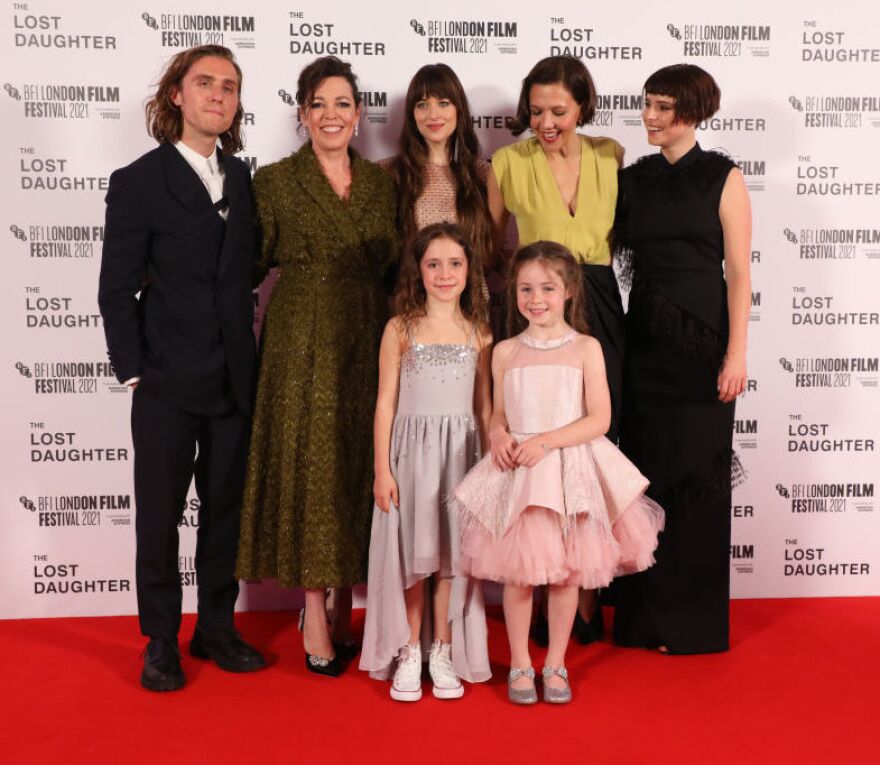The new movie The Lost Daughter shows a side of motherhood that Hollywood doesn't often depict.
Its main character Leda (played by Olivia Colman) is not a monstrous parent or a saint. She's ambivalent. She has two daughters in their 20s and is a divorced middle-aged literature professor on a "working vacation" in Greece.
Based on an Elena Ferrante novel, The Lost Daughter is actor Maggie Gyllenhaal's directorial debut.
"I got tired of seeing, like, at best, 70% of what I wanted to articulate in a film or the television show," Gyllenhaal told NPR.
She said as an actress on HBO's The Deuce, about New York's sex trade, she would write perfectly crafted essays to argue for why scenes should not be cut. "You can't cut the orgasm, or it wouldn't be a feminist scene anymore." She says her notes were always, "a little bit funny, just the right words, not too pushy." Gyllenhaal set out to make her set different.

"Meryl Streep said this thing, and I really took it to heart, which was, 'If you're an actress with an idea and you need it in order to do the scene, offer your idea with a spoonful of sugar'. And I found that was really good advice," Gyllenhaal said. "But it's a lot of extra work, and I said to myself, 'I don't need a spoonful of sugar from anybody.'"
Gyenhaal said she instead solicited ideas from her actors for The Lost Daughter, some of which became pivotal parts of the film — like putting lines about peeling an orange to a melody. Jessie Buckley, who plays a younger version of Leda, made up the tune on set with the two girls who play her daughters. It was quickly wrapped into the story.

"The song just takes it to a whole other level, and it ends up being a major key to making the film work," Gyllenhaal said. "But honestly, there are things like that all over the place. I mean, I believe in actors with ideas."
The song also exemplifies the nuance of the film: while it portrays an ambivalence about motherhood, it also portrays joyful and loving moments that provide Leda pleasure from being a parent.
"I think it's very difficult, even for adults, to hold the ambivalence of parents and mothers in their mind. And so I think we've seen lots of films and television shows where the spectrum of what's normal is pretty slim," Gyllenhaal said. "And, in fact, I think despair, terrible anxiety, confusion, along with the kind of heart-wrenching ecstasy is all a part of the spectrum of normal."
At one point in the movie, Leda does something that causes her daughters immense pain. Gyllenhaal said it was important to her that, despite that, Leda was seen.
"There's a whole tradition of movies about crazy women by great directors with phenomenal actresses ... there's some fascination with watching very interesting, powerful women go crazy. This movie is not that. This movie is about offering and challenging the audience to see if, as sane people, we can relate to her," Gyllenhaal said.

As transgressive as Leda's behavior may be, Gyllenhaal said she could relate to it. And she's had other women tell her the same. And while she wouldn't do the most hurtful thing Leda does, she ultimately felt comforted reading Ferrante's novel because she, herself, "felt very seen" by the honest depiction of a feminine experience in the world.
"A woman as a lover, a woman as a thinker, a woman as an artist ... I found it both disturbing sometimes and also comforting to feel like maybe I'm not alone with these things," Gyllenhaal said. "There's something inherently dramatic, inherently compelling about being told the truth."
The Lost Daughter is in theaters now and on Netflix on December 31.
Copyright 2021 NPR. To see more, visit https://www.npr.org.





